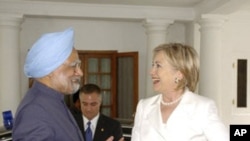U.S. President Barack Obama opens his trip to Asia this week with three days in India. The president will seek to strengthen ties with the world's second most populous nation, and one that is seeing a huge economic expansion that could help bolster a struggling economy at home. U.S. goals in the region involve Indian cooperation on issues in Afghanistan, Pakistan, Kashmir and China.
Expectations of bold and substantial results are held by both the United States and India. Arvind Subramanian of the Peterson Institute for International Economics explains.
"President Obama has very good relations with the Indian prime minister," said Subramanian. "There is a lot of trust between them. And I think he sees India very much as a rising power, which needs to be both accommodated and encouraged. But at the same time, he looks to India to take on some of the responsibilities that come with [being] an international player. So I think that is the challenge for India: on the one hand, trying to seek what it wants, but also thinking more carefully and hard about what it can contribute also as a global player."
Much of the foundation for President Obama's visit has been set by Secretary of State Hillary Clinton. Rajiv Shah heads the U.S. Agency for International Development (USAID).
"The core underlying purpose of this trip builds on some of the Secretary's [Secretary of State Hillary Clinton] travels to the region and builds on a sense that there is so much more possibility from a broader and much more expansive relationship than we have ever had before between the United States and India," said Shah. "And a partnership that is really built on and reflective of an understanding of both country's talents and capabilities, and fundamentally linking them in much broader ways than has taken place in the past."
While the relationship between the United States and India appears quite robust and promising, Arvind Subramanian cautions that agendas do not necessarily match for each nation's regional goals.
"Why I think we should lower expectations for now is that the present is somewhat problematic. It is problematic because on AF-PAK [Afghanistan-Pakistan] and Kashmir, although the objectives are shared, I do not think India and the United States see completely eye to eye on what needs to be done now," said Subramanian.
He adds that India is also concerned that a sagging economy will prompt U.S. lawmakers to increasingly protect domestic markets, especially in the information technology sector, which India is trying to export. And a long term slowdown may pose opposition to outsourcing labor. But while President Obama may be feeling the setbacks of his Democratic Party following midterm elections Tuesday, Subramanian says India may see the short term results as favorable.
"I think in the short run, having a Republican Congress will be viewed more favorably by India," he said. "I think a Republican Congress tends to be less protectionist than a Democratic Congress. I think in the short run, that is going to be good news. I think perhaps that is one area where the Democratic administration and Congress can come together, pushing the outstanding free trade agreements with Colombia and Korea, among others."
Those issues appear to be tempered by India's inclusion in the G-20. The global forum gives India a more prominent role in global economic decisions, and Shah says it also gives India a voice on a wide range of health and social concerns.
"Another way they are supporting development of course is through much more active participation in the G-20," he said. "And certainly that has become one of the primary forums for thinking about how the emerging powers can essentially engage in global efforts to address everything from climate change to poverty eradication."
Subramanian says the G-20 gives India the opportunities it seeks while the United States can use the forum to mold and expand much needed cooperation.
"The United States took the lead in changing the structures of economic governance by creating the G-20," he said. "And India is actually very appreciative of the fact that it has a seat at the table, thanks to American initiative. I think India is looking to the United States to extend that initiative to the political and security government structures, which is to give India a seat as a permanent member of the [United Nations] Security Council. As to President Obama's and many people's concern about India stepping up to the plate, I think you do notice the change within India. Having a seat at the table means that India can no longer routinely say no to every international issue. It has to think much more seriously about its responsibilities."
That role has the promise to elevate the U.S.-Indian relationship beyond bilateral issues to one that strongly influences Asian strategies and development. And President Obama has indicated that goal will require much effort beyond the glamour of his short visit this week.
US, India Aim to Strengthen Ties During Obama Visit















